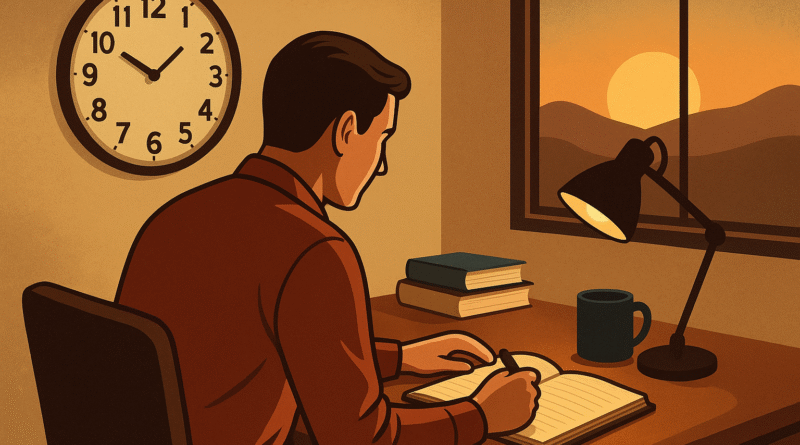How to Live on 24 Hours a Day, Arnold Bennett Explained| Life-Changing Book Summary.
How to Live on 24 Hours a Day – Detailed Summary & Review
Time is the fairest thing in the world. Every morning, life gives everyone the same gift—24 hours. No matter how rich or poor you are, you can’t buy more time or lose any. Still, some people use these hours to build happy, successful lives, while others feel like they never have enough time. Why does that happen?
This is the big question Arnold Bennett explored in his short but powerful book How to Live on 24 Hours a Day, first published in 1910. Even though it’s over 100 years old, the ideas in the book still feel fresh and useful today.
In this article, we’ll walk through the main points of the book, explain its key lessons in simple terms, and show how you can use them in your own life to feel more focused, productive, and fulfilled

A Relatable Story – The Routine Trap
Imagine a man named Raj. He wakes up every morning, quickly gets ready, rushes to work, spends his entire day in a job that pays the bills but doesn’t excite him, returns home tired, switches on the TV or scrolls through his phone for a few hours, eats dinner, and falls asleep. The next day looks exactly the same.
Raj sometimes feels frustrated. He wants to read more books, learn a new skill, or simply do something meaningful in his free time. But whenever he looks back at his day, he feels as if he never had the time.
Does this sound familiar?
Arnold Bennett’s book is written exactly for people like Raj – people who feel that life is slipping away while they are stuck in routines, wasting precious hours without realizing it. Bennett reminds us that time is life itself, and the art of living is nothing but the art of managing those 24 hours wisely.
The Central Idea of the Book
Arnold Bennett’s main idea is clear and powerful:“We all get the same 24 hours each day. What matters is how we choose to use them.”Many people waste the time they’re not working or sleeping. Instead of using those hours to learn, grow, or do something meaningful, they just go through the motions, day after day.
This book gives easy-to-follow advice to break out of that routine. It shows how to use your free time to feed your mind, build your character, and live a richer, more satisfying life.
Lesson 1: Realize the Value of Time
Bennett starts by reminding us how important time really is. Unlike money, you can’t earn more time, save it for later, or borrow it from someone. Once it’s gone, it’s gone forever.
He points out that we’re usually very careful with money—but not with time. If someone wastes our money, we get upset. But if we waste hours chatting, watching random stuff, or putting things off, we don’t think twice.
To live better, we need to change how we see time:
- Treat every minute like it matters.
- Know that wasting time is like wasting your life.
- Life isn’t just about years—it’s about how well you spend each minute.
Lesson 2: The Myth of “Not Having Time”
A common excuse people give is, “I don’t have time.” But Bennett says that’s not true—we’re just telling ourselves that.
Let’s break it down:
- We all get 24 hours each day
- Around 8 hours go to sleep
- Another 8 hours go to work
That still leaves 8 hours. Even after you subtract time for travel, eating, and housework, you still have about 4 to 5 hours left.
What you do with those free hours shapes your life. If you waste them, you stay stuck. But if you use them wisely—to learn, grow, or do something meaningful—you start building a better life.
Bennett’s advice is simple: use your free time with purpose. Don’t let it slip away without meaning.
Lesson 3: Start Small – Don’t Overhaul Overnight
One of the smartest tips in the book is to start small.
When people feel motivated, they often go overboard—planning to read for 3 hours, work out for 2, learn a new language, write a journal… all at once. It sounds great, but it’s too much. You end up feeling tired, overwhelmed, and eventually give up.
Bennett says: don’t do that. Just begin with 30 minutes a day for something that helps you grow—reading, learning, reflecting, whatever feels right. Once it becomes part of your routine, you can slowly add more.
The secret isn’t doing a lot. It’s doing a little, every day, without fail.
Lesson 4: The Importance of Evenings
Bennett says the hours after work—your evenings—are super important. But sadly, this is when most people waste time without even realizing it.
Instead of just scrolling, watching random stuff, or doing nothing much, he suggests using your evenings in a more meaningful way. Like:
- Reading good books that actually teach you something
- Exploring topics like philosophy, history, or science to stretch your thinking
- Writing, journaling, or practicing a creative skill
- Taking a few minutes to reflect on your day and plan for tomorrow
Even just 90 minutes of doing something purposeful in the evening can slowly change your life—helping you grow mentally, emotionally, and personally.
Lesson 5: Concentration is the Key
One of the biggest lessons in the book is about focus.
Bennett says we don’t just lose time by doing useless things—we also waste time when we do important things without full attention.
Like:
- Reading while checking your phone
- Thinking about work while sitting with your kids
- Doing everything in a half-hearted, distracted way
He’s clear: whatever you’re doing, be fully present. If you’re working, focus only on work. If you’re reading, really read. If you’re relaxing, then truly relax.
This habit of giving your full attention makes every minute more powerful. It’s not about doing more—it’s about doing things with intention.
Lesson 6: Intellectual Development
Bennett believed that we should spend time growing as people—not just working to earn money.
He said your job helps you survive, but real happiness comes when you feed your mind and soul.
He suggested using your free time to:
- Read meaningful books, not just light or easy ones
- Learn about philosophy to think in new ways
- Explore art, music, and culture to make life more beautiful
The goal isn’t just to know more facts—it’s to see life in a deeper, wiser, and more thoughtful way.
Lesson 7: Self-Discipline – The Ultimate Tool
No time management trick will work unless you have self-discipline.
Bennett says you need to:
- Know what’s most important to you
- Say no to things that distract you
- Stick to a daily routine
- Take charge of your time instead of letting the world pull you in every direction
When you build this kind of discipline, you start using your free time to grow, learn, and improve—rather than wasting it on things that don’t matter.
Lesson 8: Don’t Live Mechanically
One of the most beautiful lessons in the book is this: don’t live life like a robot.
Too many people just go through the motions—work, eat, sleep, repeat. They forget that life isn’t just about getting through the day. It’s about truly living—with awareness, joy, and heart.
Living well means:
- Being fully present in whatever you’re doing
- Enjoying the little things that make you smile
- Spending time with people you love and doing things you enjoy
- Using your time in ways that feel meaningful—not just following a routine
It’s not about doing more. It’s about feeling more.
Lesson 9: A Practical Exercise
Bennett gives a very doable plan for anyone who wants to start making a change.
For the next 7 days, take out just 90 minutes every evening.
- Use the first 45 minutes to read something that makes you think—like a good book, an article, or anything that helps you grow.
- Use the next 45 minutes to express yourself—write, journal, sketch, or practice a skill you care about.
Stick to this daily, and within a week, you’ll feel more confident and clear-headed. Over time, this small habit can completely change how you see yourself and your life.
Lesson 10: Time is a Daily Miracle
The book ends with a beautiful reminder:
“Time is a daily miracle.”
Every morning, life gives you 24 brand-new hours—completely free. What you do with them is your choice.
You don’t have to wait for the “perfect moment” or “someday” to start living with purpose. Every single day is a fresh chance to begin again, to be present, and to use your time in ways that truly matter.
Why This Book is Still Relevant Today
You might think, “This book was written way back in 1910—how can it still matter today?”
But honestly, it matters even more now. Back then, people had fewer distractions. Today, we’re surrounded by social media, endless scrolling, Netflix, YouTube, and constant pings from our phones. Most of our evenings disappear into screens without us even noticing.
That’s why Bennett’s advice is so powerful now. If we learn to focus better, grow our minds, and use our time with discipline, we can break free from the noise and live much deeper, richer lives than most people around us.
My Personal Review of the Book
I find How to Live on 24 Hours a Day incredibly refreshing.
“How to Live on 24 Hours a Day ” feels like a breath of fresh air. It’s short, simple, and straight to the point. Unlike many self-help books today that make things complicated, Bennett keeps it real.
His tone is firm but kind—like a wise mentor gently reminding you not to waste your time or your life.
The best thing about the book? Its simplicity. You don’t need fancy apps, planners, or complex systems. All you need is awareness, focus, and a little self-discipline.
Even if you follow just half of what Bennett says, your life will start to feel more meaningful, more productive, and more fulfilling.
Key Takeaways from How to Live on 24 Hours a Day
- Time is your life – respect it.
- You always have more free hours than you think.
- Start small with 30 minutes of self-improvement daily.
- Use evenings wisely – they are your secret weapon.
- Concentration is more powerful than multitasking.
- Develop your intellect – read, write, and reflect.
- Discipline is non-negotiable.
- Don’t live mechanically – live consciously.
- Every day is a fresh miracle of 24 hours.
Final Thoughts
Arnold Bennett’s How to Live on 24 Hours a Day is not just a book on time management; it is a guide to living well. It teaches us that we don’t need more hours – we just need to use the hours we already have more wisely.
Whether you’re a student, a professional, or someone simply feeling stuck in routine, this book can open your eyes to the power you already hold – the power of your daily 24 hours.
So the next time you say, “I don’t have time,” remember Arnold Bennett’s reminder:
👉 “We never shall have any more time. We have, and we have always had, all the time there is.”
The real question is: What will you do with it today?
Watch the full Podcast on Youtube:-
https://www.youtube.com/watch?v=kHPXPynztAs
Arnold Bennett, How to Live on 24 Hours a Day, time management tips, 24 hours a day book summary, how to manage time, productivity hacks, self discipline motivation, motivational podcast in Hinglish, book summary podcast, best books on time management, how to be productive, personal growth tips, motivational podcast India, life changing books summary, hindi book review podcast, success habits podcast,viral, book summary, usanews, trending.
